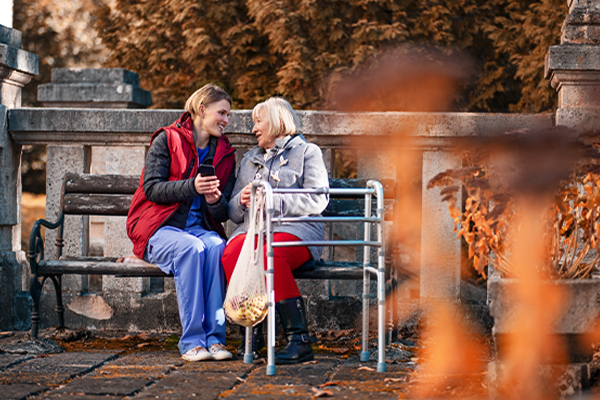As the leaves begin to change color and the weather cools down, caregivers need to be aware of how these seasonal changes can affect their elderly loved ones.
Whether you are a caregiver by purpose or you pursue that career for a living, the following tips will help you take care of your elderly patients or elderly patients during autumn:
1. Keep them warm
As the temperature outside begins to drop, you must ensure your elderly loved ones stay warm inside.
This means dressing them in layers, providing blankets, and keeping the house comfortable. It’s also vital to ensure they stay hydrated by drinking plenty of fluids.
Also, carbon monoxide poisoning increases as people use their heaters more often during autumn. It’s an invisible, odorless gas produced when fuel is burned, so check that all appliances work correctly and that there aren’t any potential fire hazards around them.
Some symptoms of CO poisoning include headache, dizziness, nausea, shortness of breath, and fatigue. If you notice these symptoms in your loved one, open the windows and get them outside into fresh air immediately. Then, call 911.
Ensure your loved one’s home has working carbon monoxide detectors to prevent CO poisoning. These detectors should be placed near all sleeping areas to wake your loved one up if there’s a CO leak.
You should also have your furnace regularly serviced by a professional to reduce the risk of leaks.
2. Help them stay active
The colder weather doesn’t mean your elderly loved ones should stop being active. On the contrary, staying active is essential for their health and well-being.
They can do plenty of indoor activities to stay active, such as walking around the house, doing light exercises, or even dancing to their favorite music. If they can go outside, take them for a walk in the park or help them rake leaves.
Be aware of falls: With the leaves falling and the ground becoming slippery, it’s essential to be extra careful of falls. Make sure walkways are clear, and there is no ice or snow on the ground. If your loved one uses a wheelchair or walker, check that the brakes are working correctly.
3. Check on their mental health
The colder weather and shorter days can also impact your elderly loved ones’ mental health. Seasonal affective disorder (SAD) is a type of depression related to changing seasons.
Symptoms of SAD include feeling hopeless, worthless, and helpless; having low energy; and experiencing changes in sleep and appetite. If you notice any of these changes in your loved ones, encourage them to see their doctor.
Also, the holiday season doesn’t make anything more straightforward, so it is good advice to consider hiring a caregiver if you can’t do it alone. Professional caregivers can provide valuable companionship and support to your loved ones during this time.
4. Beware of colds and flu
With cooler temperatures comes an increased risk of colds and flu. Make sure your loved one is staying up-to-date on their vaccinations and taking steps to avoid getting sick, such as washing their hands often and avoiding close contact with ill people.
It is good to be informed about current viruses, symptoms, and flu cases in the area. This way, you can take extra precautions if necessary. Again, the CDC website is an excellent resource for this.
Also, be prepared for power outages: Autumn storms can sometimes knock out power lines, leaving homes without electricity. This can be especially dangerous for older adults who rely on medical equipment that needs to be plugged in.
Keep an eye on the food supply: Autumn is an excellent time to stock up on non-perishable food items in case of bad weather. It’s also a good idea to have some easy-to-prepare meals on hand in case you can’t get to the grocery store.
5. Review your senior care plan
As the seasons change, reviewing your senior care plan is a good idea to ensure it’s still meeting your loved one’s needs. If you need to make any changes, now is the time to do it. Also, if you feel overwhelmed by the tasks involved in caring for your loved one, don’t hesitate to ask for help from family, friends, or professional caregivers.
We hope these tips help you and your loved one enjoy happy and healthy autumn!
